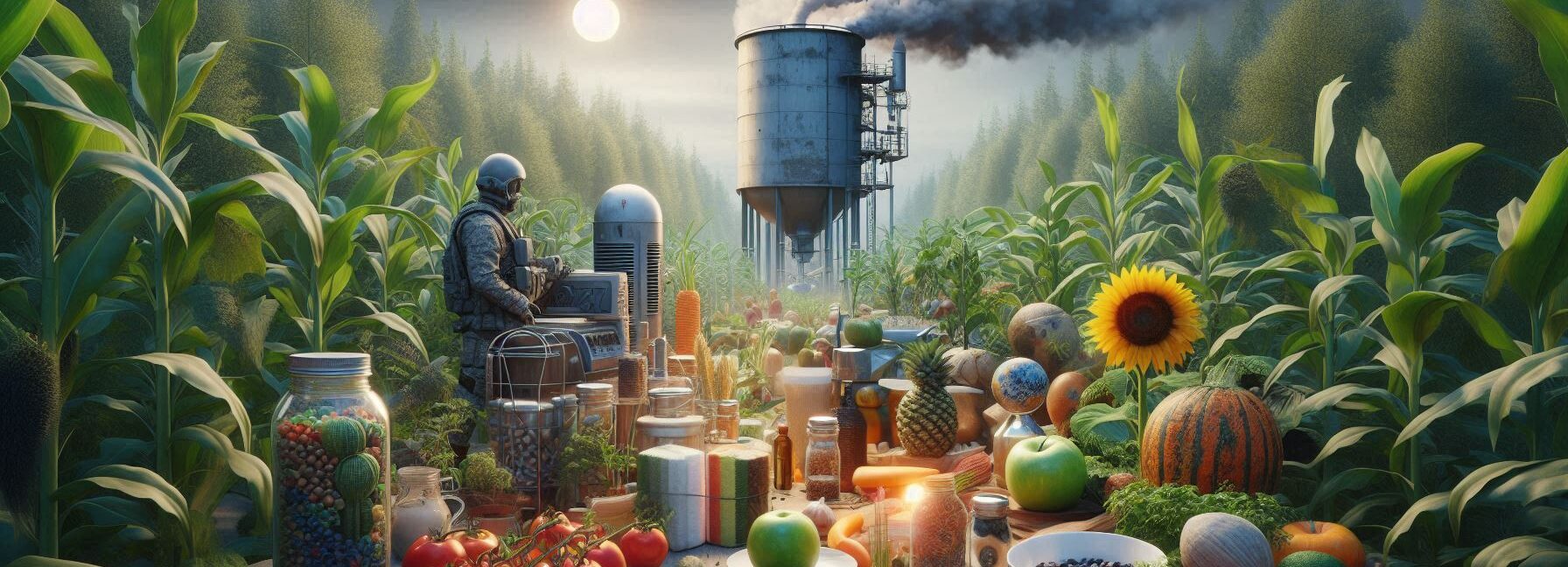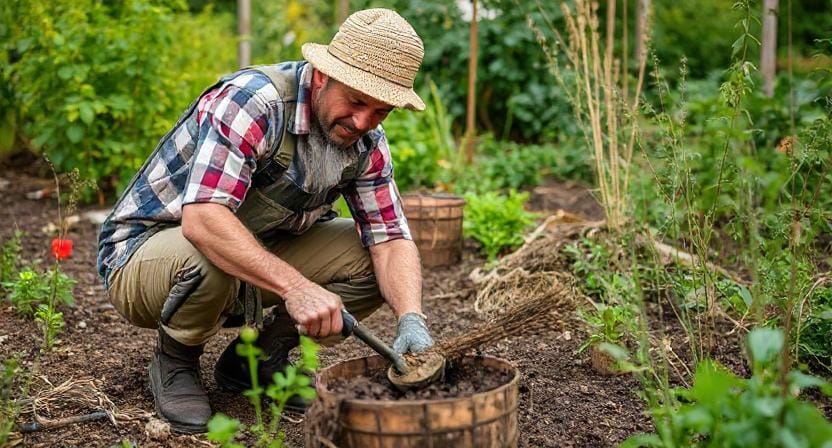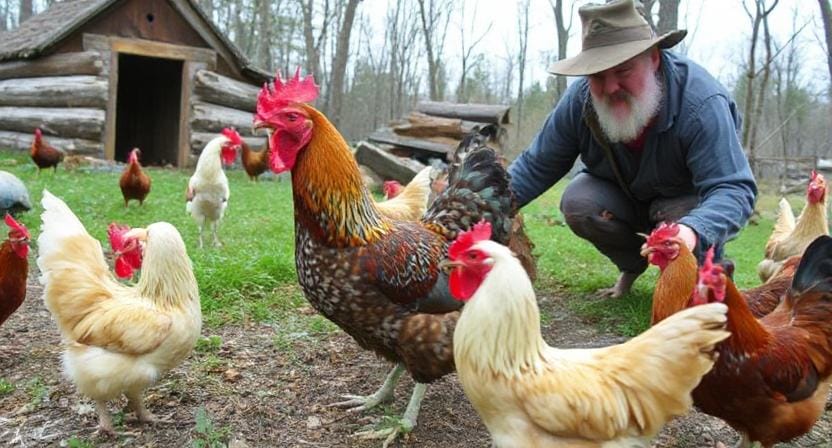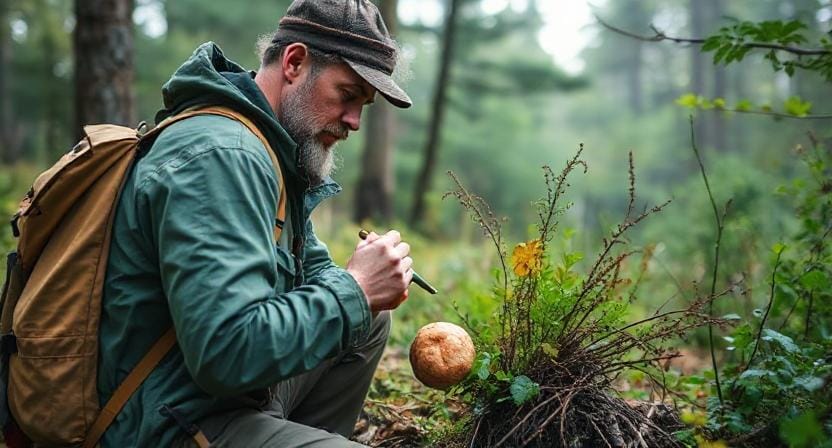Last Updated on November 2, 2025 by Kevin Collier

Top Takeaways and Key Concepts
- Learn to identify and safely forage local edible plants before venturing outdoors.
- Start a small garden using easy-to-grow vegetables and container or raised beds.
- Raise chickens in a secure coop for fresh eggs and occasional meat.
- Preserve food through canning or dehydrating to extend your harvest’s shelf life.
- Practice fishing and hunting safely while following local laws for protein variety.
So, here we are. The world has changed, and you’re out in “the great outdoors—without Wi-Fi.” Big changes, right? You’ve made it this far. Now, how do you find food? Grocery stores are empty, and your snacks are gone. No more late-night junk food runs.
Time to get creative! Think of it as a big adventure, like a treasure hunt, but instead of gold, you’re looking for delicious meals. Nature has plenty to offer if you know where to look.
Please Note: This post may contain affiliate links. If you click one of them, we may receive a commission at no extra cost to you. As an Amazon Associate, I earn from qualifying purchases.
Starting with foraging is super cool. Imagine wandering through the woods, picking berries that are just waiting for you. Blueberries and blackberries are always a fun find. Just be sure to check if they’re safe. Some plants can be tricky, like a sneaky thief.
You want to learn about edible plants. Dandelions? They’re not just pesky weeds. You can eat them! The leaves, flowers, and even roots can make a nice salad. Who knew? Your grandma would probably give you a high-five for that one.
Gardening is a must too. Even if you’ve got a tiny space, you can grow herbs in pots. Basil, mint, and parsley are easy and tasty. Imagine snipping fresh herbs for your meals. So fancy!
Fishing and hunting can be options if you feel ready. Catching your dinner sounds tough, but it can be rewarding. Just remember, you gotta follow some rules and stay safe. Head out with someone if you’re new to it. Safety in numbers, right?
Learning to cook with simple ingredients is fun too. A campfire can be your best friend. You can roast veggies or make soups. It’s like a cooking class under the stars. And trust me, it tastes even better when you know you made it yourself.
It can be too much to handle at times. You could be asking yourself, “Where do I even begin?” Take a deep breath. Keep in mind that every little bit helps. You're adding to your food supply, even if it's just one berry at a time.
You can become your own little culinary guru with little time and practice. Grandma would be amazed at how many delicious dinners you can make with what nature gives you. And who needs Wi-Fi when you can breathe fresh air, see greenery, and eat a big meal? Have fun on your adventure, dear friend!
*** Shop for Survival Gear - Tools - Kits ***
Survival Gear - Bags and Backpacks - Knives - Boots/Footwear - Communication
Outdoor Cooking - Gloves - Hydration - Dry Boxes - Water Filtration Systems
Tents - Sleeping Bags - First Aid Kits - Multi-Tools - Flashlights - Fire Starters
Navigation - Survival Food - Night Vision - Headlamps - Stun Guns - Binoculars
The Joy of Gardening: Your New Best Friend

First off, let’s talk gardening. If you thought your houseplants were hard to keep alive, get ready for a whole new level of commitment. But don’t worry! Gardening is more than just digging in dirt; it’s about growing your own food and feeling like a wizard who can conjure up dinner from thin air.
Start small—unless you want to end up with an entire farm in your backyard faster than you can say “compost.” Choose easy-to-grow vegetables like tomatoes, cucumbers, and zucchini.
These guys practically grow themselves if you give them enough sunlight and water. Honestly, I once planted a tomato plant and forgot about it for weeks. When I finally checked on it, I found tomatoes larger than my cat!
By the way, consider raised beds or container gardens if space is tight. You can grow veggies on balconies or even windowsills! And let’s not forget about companion planting—certain plants help each other grow better.
For example, planting basil alongside tomatoes will not only make your garden look fancy but also improve their flavors. It’s like giving them friendship bracelets!
Raising Chickens: Cluck Yeah!

Next on our list of survival skills is raising chickens. Yes, those feathered friends that lay eggs and provide meat! Chickens are basically little egg factories that come with built-in entertainment value—they’ll keep you laughing as they chase each other around like toddlers at a birthday party.
Before diving in headfirst into chicken ownership, check local regulations because some places have strict rules about poultry ownership (sadly). Once you're cleared for takeoff, set up a cozy coop where they can roost safely at night away from raccoons or overly ambitious cats.
Choose dual-purpose breeds like Rhode Island Reds or Orpingtons—they’re great for both eggs and meat! On average, each hen lays around five eggs per week—a solid return on investment if you ask me!
And don’t fret too much about feeding them; chickens are not picky eaters. They’ll happily munch on kitchen scraps along with grains and seeds while providing endless clucking soundtracks.
Speaking of which, be prepared to clean the coop regularly unless you want your yard smelling like an unwashed gym sock combined with last week’s leftovers.
Foraging Adventures: Nature's Buffet

If gardening isn’t quite your style or if things go sideways (as they tend to do in post-apocalyptic scenarios), then learning how to forage could save your taste buds—and maybe even your life! Imagine wandering through nature as if it were an all-you-can-eat buffet where wild edibles abound.
Start by familiarizing yourself with local edible plants—think dandelions (yes, those weeds), wild berries that look delicious but may come with hidden dangers (like thorny bushes), and mushrooms (some delightful while others might turn you into someone else's dinner).
There are many guides available online to help identify these treasures—you'll feel like Bear Grylls meets Indiana Jones!
However, always double-check what you're picking before tossing it into your salad bowl because nobody wants to accidentally serve poison ivy at their apocalypse potluck.
And honestly? Foraging is kind of fun—it feels adventurous without having to fight zombies every step of the way!
Preserving Your Harvest: Canning Like a Pro

Once you've grown or gathered enough food to feed an army (or at least yourself), it's time to think about how to keep it from going bad while you're out fighting mutant squirrels outside. Canning is the art of sealing food in jars so it can be stored for a long time.
At first, canning might appear hard because of all the jars and lids, but trust me, it's easier than putting together IKEA furniture without instructions! Before you fill glass jars and lids with tasty food from your garden or pantry, make sure they are clean.
Another great way to keep fruits and veggies fresh longer is to dehydrate them. This removes moisture so they don't degrade as quickly as milk left out on a hot day. If you're feeling brave, you can use the sun to dry apples or tomatoes. Just cut them up thinly and put them in a dehydrator.
And remember: whether you're canning pickles or drying herbs for seasoning later on during culinary experiments gone wrong… err… I mean adventures—it'll save money AND ensure tasty meals ahead!
Fishing & Hunting Skills: Channeling Your Inner Caveman
Now let’s dive into hunting and fishing skills because sometimes you'll need more than just veggies and eggs on your plate—not that there’s anything wrong with being vegetarian after the apocalypse! But hey, variety is key when survival means eating whatever doesn't bite back first.
Fishing requires some basic gear—a rod made from sticks tied together works wonders—but patience is crucial here too! Think zen-like focus as you wait for fish bites while enjoying fresh air instead of scrolling through social media feeds filled with cat videos (though we all love those).
As far as hunting goes? Well… let's just say it takes practice—and perhaps some trial-and-error moments involving questionable aim (don’t worry; no one was harmed during this training session).
Make sure you're familiar with local laws regarding hunting seasons since sneaking out early morning dressed as Rambo may land you in trouble faster than expected.
All things considered though? Mastering these skills will add protein options that'll keep hunger at bay when canned beans start tasting less appealing after months without variety!
Frequently Asked Questions
What are the first steps to building a self-sufficient food supply?
Start with learning basic foraging, planting a small garden, and securing simple protein options like eggs from chickens.
Is foraging safe for beginners?
It is safe if you only harvest plants you can positively identify and avoid anything questionable or unfamiliar.
Can small gardens produce enough food?
Small gardens can provide steady vegetables if you choose easy crops, use raised beds, and plant suited-to-climate varieties.
Why raise chickens in an apocalyptic food plan?
Chickens provide fresh eggs consistently, can be used for meat if needed, and can eat kitchen scraps for added sustainability.
How do you preserve extra harvests?
Canning, drying, and dehydrating are effective methods to extend shelf life and store food safely for long periods.
Is hunting or fishing necessary?
It is not required, but it helps diversify protein sources when gardens and eggs alone are not enough.
How do you stay consistent when stockpiling food skills?
Practice each component regularly, expand slowly, and build confidence by adding one new productive habit at a time.
Suggested Resources:
Creating Your Own Survival Garden
https://www.survivalist.com/survival-garden-guide
Homesteading 101: A Beginner's Guide
https://www.homesteading.com/beginners-guide
The Ultimate Guide to Foraging
https://www.wildfoodadventures.com/foraging-guide

Kevin Collier is a seasoned survivalist and expert in prepping and homesteading, contributing to WiseSurvive.com. With a deep-rooted passion for self-sufficiency and outdoor survival skills, Kevin shares practical advice, strategies, and resources to help individuals prepare for any challenge. His informative articles cover a range of topics, from essential survival techniques to sustainable living practices, empowering readers to thrive in any situation. Whether you're a novice or a seasoned prepper, Kevin's insights will inspire you to take charge of your readiness and build resilience for the future.




